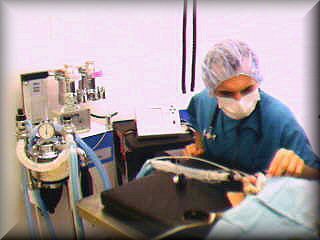
As in human medicine, anesthesia in Veterinary practise is very safe. As an advantage to safe and balance narcotics the risk during anesthesia is minimal for “healthy” pets.
To reduce any potential problems during anesthesia the over all health of your pet should be assessed prior to administration of anesthetic. Before the animal is placed under sedation our physician will conduct a physical examination and may recommend blood testing to discover any potential hidden concerns. If the pre-anesthetic blood work has results within the normal range, anesthesia will be conducted.
The administration of inter-venous fluids may be given to your pet depending on their age and the length of the procedure. Fluid therapy helps protect the kidneys during surgery, maintain your pets hydration and allow for a fast, smooth recovery from anesthesia. Patient monitoring combined with fluid therapy and blood analysis can have high costs entailed. However, having the provision of useful information concerning the health of your companion animal will greatly affect the safety and recovery of your animal during anesthesia.
